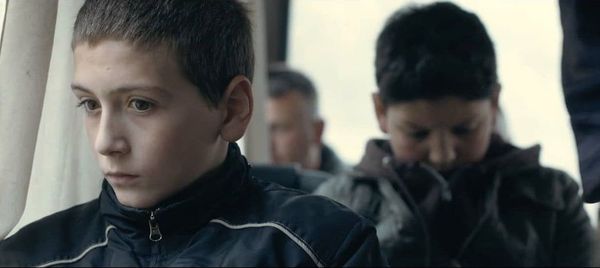Eye For Film >> Movies >> Shok (2015) Film Review
Shok
Reviewed by: Jennie Kermode

For survivors of war, small things can sometimes bring back overwhelming memories. Petrit is just driving along the road with a friend one day when he sees n abandoned bike lying there. He has to stop, get out. He'll walk the rest of the way by himself. His companion doesn't argue; in this part of the world, such things are understood.
20 years earlier, on the same road, two boys are rattling along on bike, full of life. They're on their way to see the soldiers. One is hesitant when they get there;s the other is at that stage in life when all soldiers seem exciting. They may be occupying forces, but they're his friends, he says proudly. He's a businessman. He sells them tobacco. One day, perhaps, he'll make enough money to buy a bike of his own; but by then everything will have turned upside down.

War is confusing to children in ways adults often struggle to gasp. There's nothing strange about conflict - everyone gets in fights, but fights have rules, and when rules are broken there's shame, and reparations are made. The ability of adults to ride roughshod over these conventions takes some getting used to, as does the fact that they might promise one thing and then do something quite different, or that they might seem friendly and then suddenly be vicious. Shok makes no attempt to circumvent this confusion. It's filmed very much from the children's perspective, suggesting that, though Petrit remembers, he has never tried to ake sense of it. Perhaps it's safer that way.
Though focused on the boys' friendship and the strain it comes under as result of interactions with the soldiers, the film also hints at the psychology that allows a group of people to be seen as less than human, and the temptation to abuse that develops as result of one group having overwhelming power over another. It also bears a timely message about refugees and just what it takes to drive people from homes their ancestors have occupied for generations. Its Oscar nomination is justified by the efficiency with which it sums up these constituent elements of war stories without distracting from its own central tale.
This tale is carried admirably by young leads Lum Veseli and Andi Bajgora, who seem to move easily from happy-go-lucky playfulness to a withdrawn, sullen state where there can be no hope. Their natural chemistry makes the film potent and believable; the joy they take in simple things, even in fantasies, points up the true horror of what the adults have lost.
Reviewed on: 22 Jan 2016















